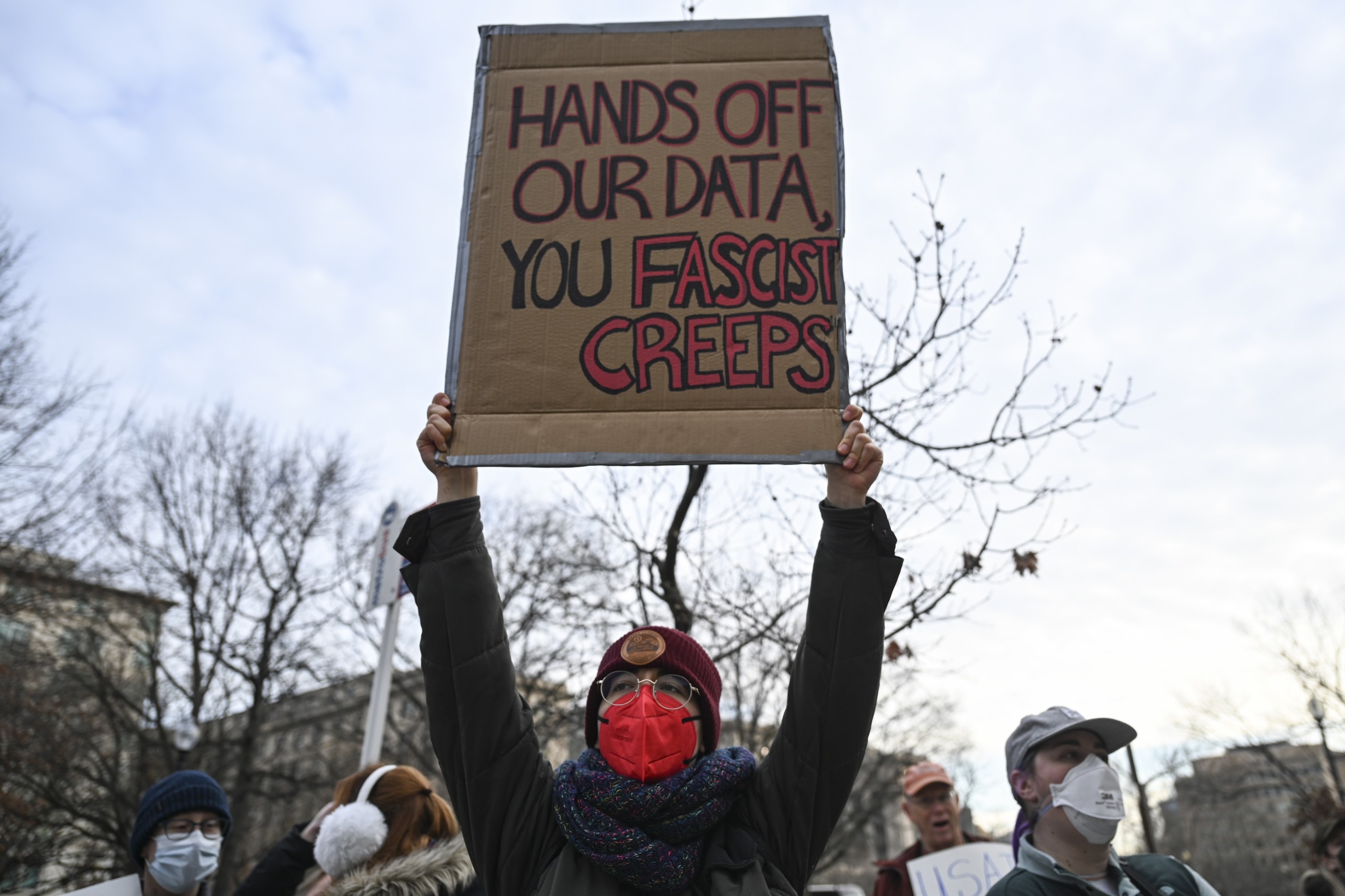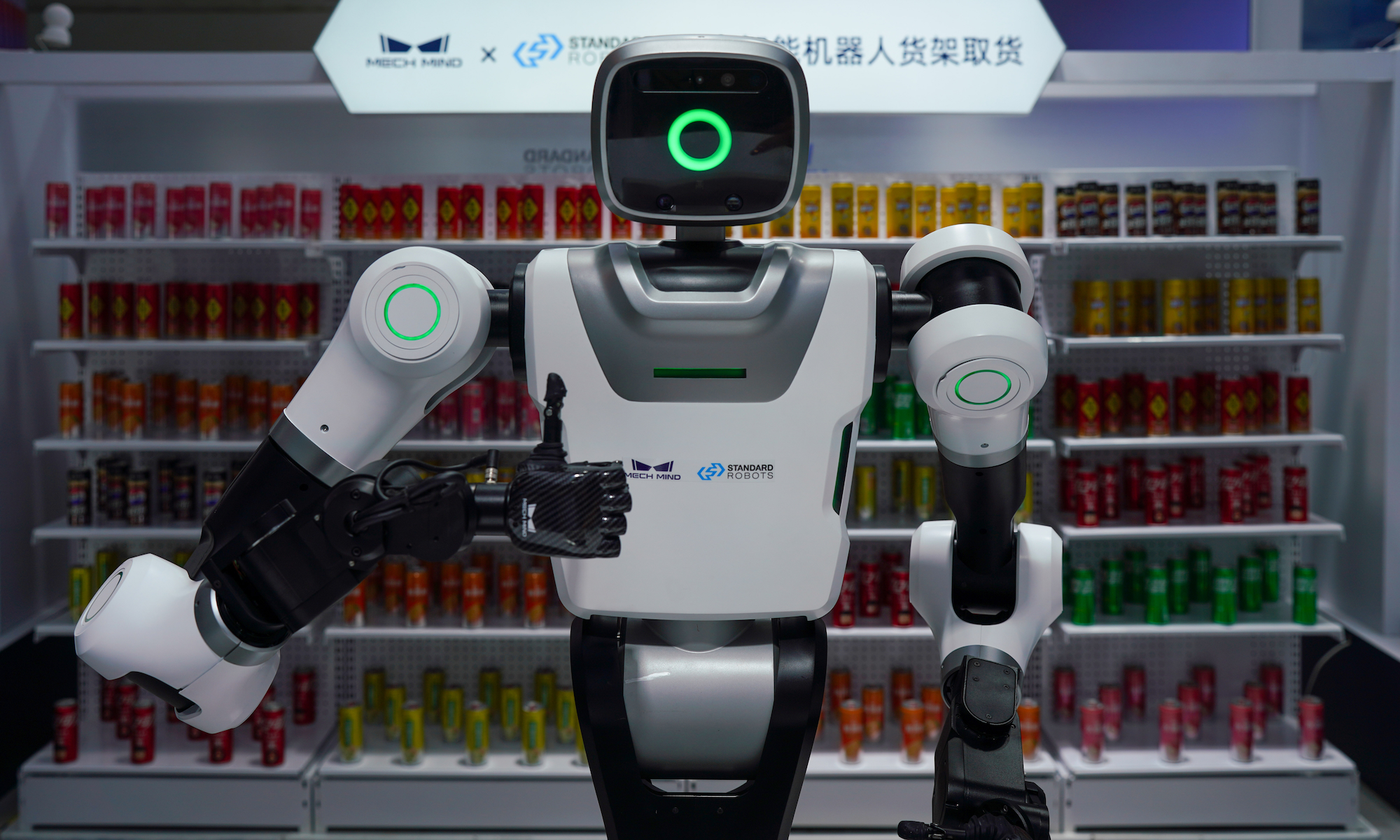The most important thing to know about both the chittering Renfields chewing through the ductwork of the American administrative state and the billionaire sociopath they serve is that they don't care. Every bit of damage they have done and will do springs from and follows this fundamental fact. They don't know anything about what they're wrecking, naturally—these are creatures that do and eat and shit on things, not ones that know—but it is more salient that they don't care enough even to try to know anything about it. They are busy and stupid in a way that mirrors their rancid imago—hardcore in a way that is mostly just erratic and impatient, secretive but grandiose, prissily paranoid, conducting their nasty business on an amphetamized and whimsical timetable—but they are also not really doing anything for the reasons that people or institutions do things.
They do not care about or understand the state because they do not acknowledge that it is valid; they do not care about or understand public service or public servants because they refuse the premise that such things could even exist. This goes beyond the private sector's familiar and self-flattering disdain for the public sector, which amounts to the load-bearing assumption that everything and everyone operating outside of the free market is somehow the minor leagues. There is another opposition at work here, a crabbed and curdled worldview that reflects libertarianism's signature balance of ideological resentment and pure childish certitude, and which is defined by the smash-and-grab anti-ethos of the vandal, but which is finally simpler and stupider than either.
Moment by moment, Musk and his strike force of greasy Beavisoid wreckers are rats in the walls, gnawing hideously through the wiring in search of richer fare. There is public money in there somewhere, and they believe it is theirs by right. Musk and his super-class of tech freaks want to get fat on it, to rescue that money from public uses that they view as inherently inefficient and unjust—spending that is "waste, fraud, and abuse" because of the ends to which it is deployed, which are public, and because of who is deploying it, which is not them. It is important to them, as a matter of efficiency and justice, that more of that money end up with them. In more deserving hands, that public wealth will be protected from the grasping public, and can be put to the uses this cohort prefers: building bigger homes behind bigger walls, booking The Chainsmokers to play 45-minute sets at the absolute worst parties in human history, hiring Famously Combative Attorneys and buying political suction, discreetly settling their endless skein of sexual harassment lawsuits. Rich person things. Real stuff.
The reflexive belief that all public stuff is fundamentally less valid and less real for being public—that the people doing public work are lazy, weak, and mediocre, and that the work they do is inherently inefficient and wasteful—is the downstream efflorescence of the toxic reactionary sludge that has been getting dumped into the water table for generations now; it is old, dumb, and very boring. The work of redirecting all those institutions built to serve the public good into something like their opposite isn't really all that new, either. That is more or less what "conservative governance" is, and what it reliably does: turning the Department Of Labor into a rubber stamp for predatory bosses, turning the Environmental Protection Agency against the environment and the U.S. Agency For International Development into something aimed more squarely at punishment and degradation.
That one powerful private citizen and his greasy minions are, with the president's blessing, seeking not just to divert these institutions but actively wreck them—to hobble or kill them, not merely shrink or redirect them; to seize the non-political means through which public money flows into and out of them and subjugate them to that citizen's preferred political ends—is new mostly in the sense that it follows that old permission to its furthest and most decisive and most destructive conclusion. All of this is made possible, and was maybe made inevitable, by how little the wreckers know or care about who and what they're wrecking. The wreckers' suspicion of that work and those workers reflects and is amplified by their incuriosity; for ideological and personal reasons, they can't even imagine it.
Doing the work that these captive agencies do—doing, even, the bad things that people and institutions can do—takes knowledge and care and collaboration. You can't build something, or improve or maintain something that anyone else built, without that knowledge and care. But anyone can swing a hammer, and someone sufficiently eager to swing that hammer won't really need to know or care where they're swinging it provided they keep doing so. Enough blows will do the job; eventually, even the blindest swing will hit something important. Nothing meaningful or enduring can be made this recklessly or this stupidly, but you can kill just about anything that way.
This is not a new observation, to say the very least. The central conceit of American governance, from the nation's founding, is a recognition of that fact. If that system was in some sense doomed from the start, given that the powerful people that designed it created its series of infuriating switchbacks and failsafes to some extent as protection against their own comeuppance or usurpation, that system was also elegantly designed, enjoyed a good long run, and was commendably prescient about the greatest threat it would face: some asshole who was unwilling to abide by or acknowledge any of those clever rules or load-bearing social obligations whenever and wherever they inconvenienced or just annoyed him, and who had become powerful enough to make that rejection everyone else's problem.
It would be anachronistic to say that America's founders anticipated Elon Musk. None of those men, with their brutal lifelong toothaches and preposterous waistcoats, their grandiose and half-sincere ambitions and shameful plantations, could have even imagined a video game like Diablo IV, let alone a wealthy adult corny enough to cheat at it in the hopes of impressing strange teenagers online. Such world-historic personal wackness would have been incomprehensible to them, as unfathomable and alien as the flavor of a Cool Ranch Dorito; it is honestly kind of hard to process even now.
But the systems and structures of the nation that they and subsequent generations made existed in large part to prevent just such a person from being able to do the damage that they correctly understood such a person would invariably do. In a system designed to run on heavily qualified but quantifiable systems of consent, Musk has repeatedly refused the premise at every turn; that cocksure and annihilating lack of care is behind everything that Elon Musk has ever done or claimed or stolen or faked or bought. As with Donald Trump, another pig-stupid rich kid and being of pure appetite, Musk's inability or refusal to believe that any other thing could be more important than him getting exactly what he wants would make him an existential threat to any system built around the idea of public good. That concept just is not real to either of them in the way that their own hunger is; none of the people they'd immiserate or incinerate would or could ever matter as much as whatever they want at this moment.
The state that the founders devised was a self-serving sham in a number of ways but very real in the most abiding one; it was, as Benjamin Franklin may or may not have put it in 1787, "a Republic, if you can keep it." However apocryphal the quote, the premise is inarguable. Such a system could absolutely last for as long as the people in charge of it and the population it comprised and represented remained serious about and committed to caring for and improving it, but probably not much longer than that.
This ongoing administrative coup is being handled in roughly the same way as Musk's purchase and desecration of Twitter back in 2022. Among Musk's fellow clammy tech lordlings, that purchase is seen as an inspired bit of executive leadership and smashing full-spectrum success. By conventional standards, it absolutely wasn't. “Our user growth is stagnant, revenue is unimpressive, and we’re barely breaking even,” Musk wrote in an email to staff back in January. By that point, Musk had rushed through mass firings and eliminated various redundancies that left the site wobblier, scammier, spammier, smaller, and worse; that it did not tip over entirely after all that self-inflicted damage was enough to make it an epic triumph by Musk's cohort's standards. Musk subsequently commissioned and promoted The Twitter Files, a series of alternately tendentious and outright false misreadings of internal Twitter documents by Musk's pet journalists that was designed to demonstrate the perfidy of previous management and mostly demonstrated Musk's cosmically poor reading comprehension.
For most Twitter users, it was a disaster. A site that once worked decently well for a large and enthusiastic user base as a way to learn things and talk shit and have fun was, after Musk scrapped what he could and seized control of the algorithm, no longer good for anything but amplifying the main-character status and bespoke bigotries of its owner, a thuddingly witless power user who is now by any standard the worst poster in history. What worked decently well for Musk necessarily benefitted virtually no one else. It is impossible to imagine the site making any kind of comeback on its own merits under Musk's ownership; there is just too much of his mess smeared across it. It is a dying mall overrun by goblins and skunks.
And yet it is hard to say that any of that has really hurt Musk, personally, give or take the loss of several hundred million dollars. This, or this alongside his natural wrecker's instinct, explains why Musk would put those lessons into action in the rolling program of vandalism and hostage-taking he's currently leading across the federal government. The insulting emails Musk's team blasted out to the federal workforce encouraging them to quit—"the federal workforce should be comprised of employees who are reliable, loyal, trustworthy, and who strive for excellence in their daily work," wrote one of the most unreliable, least loyal, most lavishly untrustworthy men in recent history—were a hasty rewrite of the ones he'd sent to Twitter's employees; the subject lines were more or less the same.
It is, of course, a very stupid and irresponsible thing to run the federal government like a vanity social media sideline. Musk removed the systems and personnel that kept Twitter running smoothly sort of on principle and sort of out of spite, and made it much worse; the consequences would necessarily be much steeper if he did the same to, say, the Veterans Administration or Social Security. "My central terror," the researcher Nathan Tankus told The American Prospect, "although there are a million ones you can pick, is that based on Musk's history, the redundancies which are the premise of mission-critical IT systems, the premise that this must never fail, he's going to look at it and say 'look at this inefficiency.' A mission-critical system has to be inefficient because that's how you make sure it functions all the time."
This would be the sort of thing you'd care about, if you were someone that cared about this sort of thing. Musk is not, and the recklessness with which he and his minions have gone about their campaign of coercion and demolition has borne this out. It's worth bearing in mind here that Musk just isn't a very smart or principled guy, and has been insulated from any accountability by his wealth for long enough to have more or less liquefied into a slurry of his defects; ask him to find efficiencies in the government and he will naturally gravitate towards "just don't pay what was promised" because it is easiest, and because it is cruel, and because he himself has been getting away with doing that sort of thing for so long.
For serial violators of this particular clause of the social contract like Trump and Musk, that means stiffing contractors and counterparties in the assumption that they won't be able to do anything about it. In the case of the federal payment systems that Musk and his zoomerkorps gained access to over the weekend, those parties are federally supported charities and grant recipients, Social Security and Medicare beneficiaries, government employees and the many, many others who have been authorized by Congress to receive funds from the federal government, and who are now at risk of not receiving them. The assumption, which is in point of fact more of a taunt, remains the same: that Congress or the courts or the public, or all of them together, simply do not have the right or the capacity to stop them from doing any of it. So far, in virtually every instance, they have barely even tried.
All of it—the agency websites crudely scrubbed or taken down entirely, the ham-handed threats of firings and oafish wheedling attempts to get federal employees to resign, Musk's dorky signifying on social media about all the agencies and programs he has "deleted"—proceed from the raiders' belief in their own impunity. There is in all this headlong flipping of switches and fiddling with knobs and pulling of plugs the abiding sense that none of it actually matters very much, and a smug and seething certainty that none of that vandalism could ever really have any consequences for the people doing it.
Not negative ones, anyway. Musk could always replace the public services he destroys or deletes with inferior versions provided through the private platforms he owns. On Monday, the former Tesla engineer and new Technology Transformation Services director Thomas Shedd expressed his desire to bring an "AI-first strategy" to both the General Services Administration and other government agencies. That massive public subsidy for the AI companies, like the one Musk himself owns, whose flubby and insecure technology would replace all those public servants Musk aims to fire, effectively represents the only hope for that industry, which has otherwise failed at astonishing expense to generate anything consumers need or want or really much like, to ever make a profit. The people that reflexively view any and all public-oriented public spending as waste, fraud, and abuse do not necessarily oppose the spending so much as where and with whom that money ends up. It's absolutely what it looks like: an assertion that money previously spent saving lives would be better spent if distributed among a few twitchy billionaires' pet endeavors.
The professed idea here, which is no less dangerous for how fatuous it is, is to run the government not just like a business, but like a technology start-up. For Musk, that is more or less cosplay—a "start-up," for him, is when everyone sleeps in the office and barely gets paid and does whatever he says as soon as he says it. What that reimagining amounts to, in this case, is taking something big and making it small enough and weak enough that he can control it.
The two capitalists currently working in tenuous harmony to replace the republic each have their own visions of how a state notionally run by and for the people might be made more like a business run by and for their own personal benefit. Trump's vision is the government as Mar-a-Lago, a gilded ballroom accessible only to dues-paying members within which those rich dummies gossip and feud and poke inedible food around their plates, pausing only to roar with applause whenever Trump himself does anything. Musk's vision of the state is more along the lines of the wreck he made of Twitter when he tried to start it over—a machine that exalts and serves only him, where service declines and subscription prices climb in tandem forever and any public questions receive an automated reply in the form of one grinning poop emoji.
The difference, this time, would be that no one can ever really leave. You can still see the dignified bones of the grand thing these brutal and stupid visions aim to replace, and they look sturdy enough. It is nice to think that, when this mess is swept out by flood or just an overdue change in ownership, it might be possible to build something new in there.






